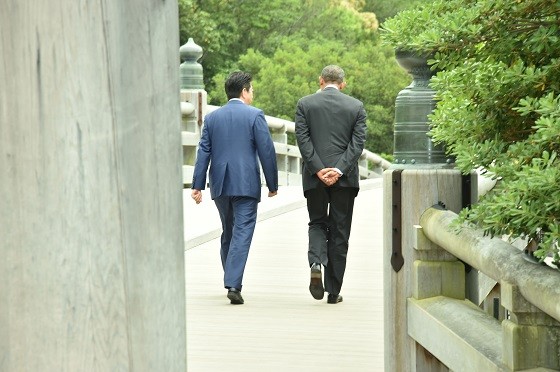Media Report

- The Financial Times reports: "China's foreign minister fired a pre-emptive shot at G7 leaders gathering in Japan on Thursday, warning them not to 'escalate tensions' over territorial disputes in the South and East China Seas....'We hope the G7 will focus on urgent economic and financial matters,' Wang Yi said at a briefing in Beijing. 'We do not want to see actions that escalate tensions in the region.'...In September Beijing will host Mr Obama, Mr Cameron and Japanese Prime Minister Shinzo Abe at a G20 meeting of developed and developing economies in Hangzhou, where Mr Wang made clear that his government would not tolerate a debate over regional territorial disputes. 'The G20's central task is to promote growth,' he said. 'If some members want to discuss issues not related to the international economy in an attempt to raise tensions, we will not allow this to happen.'"
- The Associated Press reports: "China accused the United States on Thursday of hampering trade after Washington imposed duties of up to 450 percent on Chinese steel in its latest response to a flood of low-priced imports. The Ministry of Commerce complained U.S. regulators discriminated against Chinese suppliers by using incorrect standards for deciding what production cost and market prices should have been....'The United States has deliberately suppressed the bulk of Chinese steel exports,' said a Commerce Ministry statement. 'This not only harms Chinese steel enterprises but hinders trade and cooperation between enterprises.' It said Beijing will 'take all necessary measures to fight for fair treatment' but gave no details."
- The New York Times Editorial Board writes in a commentary: "China has been behaving in a bellicose fashion in the South China Sea for some time as part of a sustained and increasingly dangerous effort to assert sovereignty over a vital waterway in which other nations also have claims....The right response would be for China to accept the [international arbitration] court's decision and work with the Philippines and other neighboring countries that have interests in the region — Vietnam, Malaysia, Brunei and Taiwan — on a mutually acceptable resolution to their rival claims....These issues are expected to be a major focus of President Obama's trip to Asia, which is scheduled to begin this weekend with visits to Vietnam and Japan....One encouraging note in the Pentagon report is the finding that while China has been willing to tolerate higher levels of tension in pursuit of its maritime claims, it 'still seeks to avoid direct and explicit conflict with the United States.' The challenge for all sides is making that aspiration a reality."
Calendar
- 2016-05-25 On the Agenda But Off Guest List, China Eyes G-7 in Japan
- 2016-05-24 Don’t start a fire in Asia, China warns Obama after Vietnam arms embargo lifted
- 2016-05-23 China plans base station for rescue operations in South China Sea
- 2016-05-22 US wields biggest stick in trade dumping fight
- 2016-05-20 Taiwan President Takes Cautious Line on China at Inauguration
- 2016-05-19 China, Denying Close Encounter With American Plane, Points Finger at U.S.
- 2016-05-18 China criticizes US steel anti-dumping measures
- 2016-05-17 Top ranked Chinese official to 'listen' to HK demands as independence calls grow
- 2016-05-16 China Housing Revival Buffers Economy
- 2016-05-15 Maoists Still a Force 50 Years After the Cultural Revolution
News
- The Financial Times China warns G7 not to 'escalate tensions' in Asia
- The New York Times China Accuses US of Hampering Trade With Steel Duties
- Reuters China says it followed rules in U.S. aircraft intercept
- The Wall Street Journal 1MDB Unit Bought by China Nuclear Firm Was Distressed, Auditor Says
- The Washington Post 5 accused of trafficking phony fragrances from China to NYC
- Bloomberg Business G-7 Agrees to Tackle China Dumping After EU Chiefs Warn on Steel
- The Guardian China's 'feud' over economic reform reveals depth of Xi Jinping's secret state
- Reuters G7 agrees need strong message on South China Sea, China says don't 'hype'
- The Washington Post China top general visits Japan WWII chemical weapons site
- The New York Times Southeast Asia's Dance With China
- TIME Chinese Military Official Ridicules Taiwan's President for Being Unmarried
- The Wall Street Journal GM Recalls 2.16 Million Cars in China
- The Washington Post The Latest: Obama says G-7 leaders focus on economic growth
Commentary
- The New York Times Playing Chicken in the South China Sea
- The Economist China's Florida
- The National Interest Is China Really That Dangerous?
- The Wall Street Journal: MoneyBeat Is China Sending a Message to the Fed Through the Yuan?
- The Diplomat China's Increasing Numbers of Fake Universities
- The New York Times: Sinosphere Bus Project Finds a Way Around China's Traffic Jams: Gliding Above Them
- The Wall Street Journal: China Real Time Not Enough Character? Communist Party Frets Over Constitution Copying
